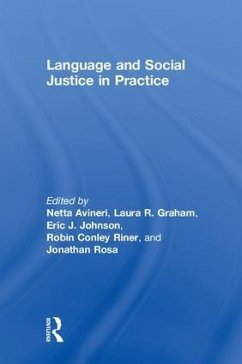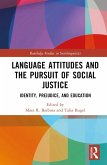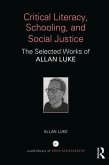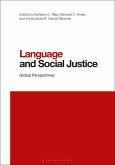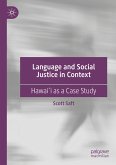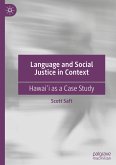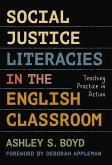Language and Social Justice in Practice
Herausgeber: Avineri, Netta; Rosa, Jonathan; Conley Riner, Robin; Johnson, Eric J; Graham, Laura R
Language and Social Justice in Practice
Herausgeber: Avineri, Netta; Rosa, Jonathan; Conley Riner, Robin; Johnson, Eric J; Graham, Laura R
- Gebundenes Buch
- Merkliste
- Auf die Merkliste
- Bewerten Bewerten
- Teilen
- Produkt teilen
- Produkterinnerung
- Produkterinnerung
This book uses case studies by leading and emergent scholars and practitioners written especially for undergraduate audiences, and is ideal for introductory courses on social justice in linguistics and anthropology.
Andere Kunden interessierten sich auch für
![Language Attitudes and the Pursuit of Social Justice Language Attitudes and the Pursuit of Social Justice]() Language Attitudes and the Pursuit of Social Justice189,99 €
Language Attitudes and the Pursuit of Social Justice189,99 €![Critical Literacy, Schooling, and Social Justice Critical Literacy, Schooling, and Social Justice]() Allan LukeCritical Literacy, Schooling, and Social Justice202,99 €
Allan LukeCritical Literacy, Schooling, and Social Justice202,99 €![Language and Social Justice Language and Social Justice]() Language and Social Justice222,99 €
Language and Social Justice222,99 €![Language and Social Justice in Context Language and Social Justice in Context]() Scott SaftLanguage and Social Justice in Context88,99 €
Scott SaftLanguage and Social Justice in Context88,99 €![Language and Social Justice in Context Language and Social Justice in Context]() Scott SaftLanguage and Social Justice in Context88,99 €
Scott SaftLanguage and Social Justice in Context88,99 €![Legal-Lay Discourse and Procedural Justice in Family and County Courts Legal-Lay Discourse and Procedural Justice in Family and County Courts]() Tatiana GrieshoferLegal-Lay Discourse and Procedural Justice in Family and County Courts77,99 €
Tatiana GrieshoferLegal-Lay Discourse and Procedural Justice in Family and County Courts77,99 €![Social Justice Literacies in the English Classroom Social Justice Literacies in the English Classroom]() Ashley S BoydSocial Justice Literacies in the English Classroom97,99 €
Ashley S BoydSocial Justice Literacies in the English Classroom97,99 €-
-
-
This book uses case studies by leading and emergent scholars and practitioners written especially for undergraduate audiences, and is ideal for introductory courses on social justice in linguistics and anthropology.
Hinweis: Dieser Artikel kann nur an eine deutsche Lieferadresse ausgeliefert werden.
Hinweis: Dieser Artikel kann nur an eine deutsche Lieferadresse ausgeliefert werden.
Produktdetails
- Produktdetails
- Verlag: Taylor & Francis
- Seitenzahl: 268
- Erscheinungstermin: 13. Dezember 2018
- Englisch
- Abmessung: 229mm x 152mm x 16mm
- Gewicht: 531g
- ISBN-13: 9781138069442
- ISBN-10: 1138069442
- Artikelnr.: 56896085
- Herstellerkennzeichnung
- Libri GmbH
- Europaallee 1
- 36244 Bad Hersfeld
- 06621 890
- Verlag: Taylor & Francis
- Seitenzahl: 268
- Erscheinungstermin: 13. Dezember 2018
- Englisch
- Abmessung: 229mm x 152mm x 16mm
- Gewicht: 531g
- ISBN-13: 9781138069442
- ISBN-10: 1138069442
- Artikelnr.: 56896085
- Herstellerkennzeichnung
- Libri GmbH
- Europaallee 1
- 36244 Bad Hersfeld
- 06621 890
Netta Avineri is Associate Professor of Teaching English to Speakers of Other Languages/Teaching Foreign Language (TESOL/TFL) at the Middlebury Institute of International Studies at Monterey. Laura R. Graham is Professor of Anthropology at the University of Iowa. She served as Chair of the American Anthropological Association's Committee on Human Rights and is founding Chair of the Association's Committee on Language and Social Justice. Eric J. Johnson is Associate Professor of Bilingual/ESL Education at Washington State University Tri-Cities. Robin Conley Riner is Associate Professor of Anthropology at Marshall University. Jonathan Rosa is Assistant Professor in the Graduate School of Education, Center for Comparative Studies in Race and Ethnicity, and, by courtesy, Departments of Anthropology and Linguistics, at Stanford University.
List of Figures
List of Tables
List of Contributors
Acknowledgements
Introduction: Reimagining Language and Social Justice
Netta Avineri, Laura R. Graham, Eric J. Johnson, Robin Conley Riner, and
Jonathan Rosa
Part I: Language and Race
Introduction and Critical Questions
1: "Never Tell Me How to Say It": Race, Language Ideologies, and Harm
Reduction in Secondary English Classrooms
Julia R. Daniels
2: Identifying "Racists" While Ignoring Racism: The Case of the Alleged
Slur on George Zimmerman's 911 Tape
Adam Hodges
3: Contesting Representations of Migrant "Illegality" through the Drop the
I-Word Campaign: Rethinking Language Change and Social Change
Jonathan Rosa
Chapter 4: Communicating and Contesting Islamophobia
Mariam Durrani
Chapter 5: Languages of Liberation: Digital Discourses of Emphatic
Blackness
Krystal A. Smalls
Part II: Language and Education
Introduction and Critical Questions
6: Issues of Equity in Dual Language Bilingual Education
Kathryn I. Henderson, Lina Martín-Corredor, and Genevieve Caffrey
7: Colorado's READ Act: A Case Study in Policy Advocacy against Monolingual
Normativity
Kara Mitchell Viesca and Luis E. Poza
8: Dual Language Education as a State Equity Strategy
Kathryn Lindholm-Leary, Martha I. Martinez, and Rosa G. Molina
9: Ubuntu Translanguaging and Social Justice: Negotiating Power and
Identity through Multilingual Education in Tanzania
Monica Shank Lauwo
10: A Critical Interrogation of the "Language Gap"
Eric J. Johnson
Part III: Language and Health
Introduction and Critical Questions
11: Language, Justice, and Rabies: Notes from a Fatal Crossroads
Charles L. Briggs
12: Ethics, Expertise, and Inequities in Global Health Discourses: The Case
of Non-Profit HIV/AIDS Research in South Africa
Steven P. Black
13: Interpreting Deaf HIV/AIDS: A Dialogue
Mark Byrd and Leila Monaghan
14: Language as Health: Healing in Indigenous Communities in Guatemala
through the Revitalization of Mayan Languages
David Flood, Anita Chary, Peter Rohloff, and Brent Henderson
Part IV: Language and Social Activism
Introduction and Critical Questions
15: Mascots, Name Calling, and Racial Slurs: Seeking Social Justice through
Audience Coalescence
Netta Avineri and Bernard C. Perley
16: The Language of Activism: Representations of Social Justice in a
University Space in Argentina
Suriati Abas and James S. Damico
17: California Latinx Youth as Agents of Sociolinguistic Justice
Mary Bucholtz, Dolores Inés Casillas, and Jin Sook Lee
18: Pronouns and Possibilities: Transgender Language Activism and Reform
Lal Zimman
19: (De)Occupying Language
H. Samy Alim
Part V: Language, Law, and Policy
Introduction and Critical Questions
20: A'uw¿-Xavante Represent: Rights and Resistance in Native Language
Signage on Brazil's Federal Highways
Laura R. Graham
21: The Universal Declaration of Linguistic Rights
Joyce Milambiling
22: "Linguistically Isolated": Challenging the U.S. Census Bureau's Harmful
Classification
Ana Celia Zentella
23: Immigrants Facing Linguistic Barriers in the U.S. Justice System: Case
Studies from North Carolina
Dominika Baran and Quinn Holmquist
24: Communicating Humanity: How Defense Attorneys Use Mitigation Narratives
to Advocate for Clients
Robin Conley Riner and Elizabeth S. Vartkessian
Index
List of Tables
List of Contributors
Acknowledgements
Introduction: Reimagining Language and Social Justice
Netta Avineri, Laura R. Graham, Eric J. Johnson, Robin Conley Riner, and
Jonathan Rosa
Part I: Language and Race
Introduction and Critical Questions
1: "Never Tell Me How to Say It": Race, Language Ideologies, and Harm
Reduction in Secondary English Classrooms
Julia R. Daniels
2: Identifying "Racists" While Ignoring Racism: The Case of the Alleged
Slur on George Zimmerman's 911 Tape
Adam Hodges
3: Contesting Representations of Migrant "Illegality" through the Drop the
I-Word Campaign: Rethinking Language Change and Social Change
Jonathan Rosa
Chapter 4: Communicating and Contesting Islamophobia
Mariam Durrani
Chapter 5: Languages of Liberation: Digital Discourses of Emphatic
Blackness
Krystal A. Smalls
Part II: Language and Education
Introduction and Critical Questions
6: Issues of Equity in Dual Language Bilingual Education
Kathryn I. Henderson, Lina Martín-Corredor, and Genevieve Caffrey
7: Colorado's READ Act: A Case Study in Policy Advocacy against Monolingual
Normativity
Kara Mitchell Viesca and Luis E. Poza
8: Dual Language Education as a State Equity Strategy
Kathryn Lindholm-Leary, Martha I. Martinez, and Rosa G. Molina
9: Ubuntu Translanguaging and Social Justice: Negotiating Power and
Identity through Multilingual Education in Tanzania
Monica Shank Lauwo
10: A Critical Interrogation of the "Language Gap"
Eric J. Johnson
Part III: Language and Health
Introduction and Critical Questions
11: Language, Justice, and Rabies: Notes from a Fatal Crossroads
Charles L. Briggs
12: Ethics, Expertise, and Inequities in Global Health Discourses: The Case
of Non-Profit HIV/AIDS Research in South Africa
Steven P. Black
13: Interpreting Deaf HIV/AIDS: A Dialogue
Mark Byrd and Leila Monaghan
14: Language as Health: Healing in Indigenous Communities in Guatemala
through the Revitalization of Mayan Languages
David Flood, Anita Chary, Peter Rohloff, and Brent Henderson
Part IV: Language and Social Activism
Introduction and Critical Questions
15: Mascots, Name Calling, and Racial Slurs: Seeking Social Justice through
Audience Coalescence
Netta Avineri and Bernard C. Perley
16: The Language of Activism: Representations of Social Justice in a
University Space in Argentina
Suriati Abas and James S. Damico
17: California Latinx Youth as Agents of Sociolinguistic Justice
Mary Bucholtz, Dolores Inés Casillas, and Jin Sook Lee
18: Pronouns and Possibilities: Transgender Language Activism and Reform
Lal Zimman
19: (De)Occupying Language
H. Samy Alim
Part V: Language, Law, and Policy
Introduction and Critical Questions
20: A'uw¿-Xavante Represent: Rights and Resistance in Native Language
Signage on Brazil's Federal Highways
Laura R. Graham
21: The Universal Declaration of Linguistic Rights
Joyce Milambiling
22: "Linguistically Isolated": Challenging the U.S. Census Bureau's Harmful
Classification
Ana Celia Zentella
23: Immigrants Facing Linguistic Barriers in the U.S. Justice System: Case
Studies from North Carolina
Dominika Baran and Quinn Holmquist
24: Communicating Humanity: How Defense Attorneys Use Mitigation Narratives
to Advocate for Clients
Robin Conley Riner and Elizabeth S. Vartkessian
Index
List of Figures
List of Tables
List of Contributors
Acknowledgements
Introduction: Reimagining Language and Social Justice
Netta Avineri, Laura R. Graham, Eric J. Johnson, Robin Conley Riner, and
Jonathan Rosa
Part I: Language and Race
Introduction and Critical Questions
1: "Never Tell Me How to Say It": Race, Language Ideologies, and Harm
Reduction in Secondary English Classrooms
Julia R. Daniels
2: Identifying "Racists" While Ignoring Racism: The Case of the Alleged
Slur on George Zimmerman's 911 Tape
Adam Hodges
3: Contesting Representations of Migrant "Illegality" through the Drop the
I-Word Campaign: Rethinking Language Change and Social Change
Jonathan Rosa
Chapter 4: Communicating and Contesting Islamophobia
Mariam Durrani
Chapter 5: Languages of Liberation: Digital Discourses of Emphatic
Blackness
Krystal A. Smalls
Part II: Language and Education
Introduction and Critical Questions
6: Issues of Equity in Dual Language Bilingual Education
Kathryn I. Henderson, Lina Martín-Corredor, and Genevieve Caffrey
7: Colorado's READ Act: A Case Study in Policy Advocacy against Monolingual
Normativity
Kara Mitchell Viesca and Luis E. Poza
8: Dual Language Education as a State Equity Strategy
Kathryn Lindholm-Leary, Martha I. Martinez, and Rosa G. Molina
9: Ubuntu Translanguaging and Social Justice: Negotiating Power and
Identity through Multilingual Education in Tanzania
Monica Shank Lauwo
10: A Critical Interrogation of the "Language Gap"
Eric J. Johnson
Part III: Language and Health
Introduction and Critical Questions
11: Language, Justice, and Rabies: Notes from a Fatal Crossroads
Charles L. Briggs
12: Ethics, Expertise, and Inequities in Global Health Discourses: The Case
of Non-Profit HIV/AIDS Research in South Africa
Steven P. Black
13: Interpreting Deaf HIV/AIDS: A Dialogue
Mark Byrd and Leila Monaghan
14: Language as Health: Healing in Indigenous Communities in Guatemala
through the Revitalization of Mayan Languages
David Flood, Anita Chary, Peter Rohloff, and Brent Henderson
Part IV: Language and Social Activism
Introduction and Critical Questions
15: Mascots, Name Calling, and Racial Slurs: Seeking Social Justice through
Audience Coalescence
Netta Avineri and Bernard C. Perley
16: The Language of Activism: Representations of Social Justice in a
University Space in Argentina
Suriati Abas and James S. Damico
17: California Latinx Youth as Agents of Sociolinguistic Justice
Mary Bucholtz, Dolores Inés Casillas, and Jin Sook Lee
18: Pronouns and Possibilities: Transgender Language Activism and Reform
Lal Zimman
19: (De)Occupying Language
H. Samy Alim
Part V: Language, Law, and Policy
Introduction and Critical Questions
20: A'uw¿-Xavante Represent: Rights and Resistance in Native Language
Signage on Brazil's Federal Highways
Laura R. Graham
21: The Universal Declaration of Linguistic Rights
Joyce Milambiling
22: "Linguistically Isolated": Challenging the U.S. Census Bureau's Harmful
Classification
Ana Celia Zentella
23: Immigrants Facing Linguistic Barriers in the U.S. Justice System: Case
Studies from North Carolina
Dominika Baran and Quinn Holmquist
24: Communicating Humanity: How Defense Attorneys Use Mitigation Narratives
to Advocate for Clients
Robin Conley Riner and Elizabeth S. Vartkessian
Index
List of Tables
List of Contributors
Acknowledgements
Introduction: Reimagining Language and Social Justice
Netta Avineri, Laura R. Graham, Eric J. Johnson, Robin Conley Riner, and
Jonathan Rosa
Part I: Language and Race
Introduction and Critical Questions
1: "Never Tell Me How to Say It": Race, Language Ideologies, and Harm
Reduction in Secondary English Classrooms
Julia R. Daniels
2: Identifying "Racists" While Ignoring Racism: The Case of the Alleged
Slur on George Zimmerman's 911 Tape
Adam Hodges
3: Contesting Representations of Migrant "Illegality" through the Drop the
I-Word Campaign: Rethinking Language Change and Social Change
Jonathan Rosa
Chapter 4: Communicating and Contesting Islamophobia
Mariam Durrani
Chapter 5: Languages of Liberation: Digital Discourses of Emphatic
Blackness
Krystal A. Smalls
Part II: Language and Education
Introduction and Critical Questions
6: Issues of Equity in Dual Language Bilingual Education
Kathryn I. Henderson, Lina Martín-Corredor, and Genevieve Caffrey
7: Colorado's READ Act: A Case Study in Policy Advocacy against Monolingual
Normativity
Kara Mitchell Viesca and Luis E. Poza
8: Dual Language Education as a State Equity Strategy
Kathryn Lindholm-Leary, Martha I. Martinez, and Rosa G. Molina
9: Ubuntu Translanguaging and Social Justice: Negotiating Power and
Identity through Multilingual Education in Tanzania
Monica Shank Lauwo
10: A Critical Interrogation of the "Language Gap"
Eric J. Johnson
Part III: Language and Health
Introduction and Critical Questions
11: Language, Justice, and Rabies: Notes from a Fatal Crossroads
Charles L. Briggs
12: Ethics, Expertise, and Inequities in Global Health Discourses: The Case
of Non-Profit HIV/AIDS Research in South Africa
Steven P. Black
13: Interpreting Deaf HIV/AIDS: A Dialogue
Mark Byrd and Leila Monaghan
14: Language as Health: Healing in Indigenous Communities in Guatemala
through the Revitalization of Mayan Languages
David Flood, Anita Chary, Peter Rohloff, and Brent Henderson
Part IV: Language and Social Activism
Introduction and Critical Questions
15: Mascots, Name Calling, and Racial Slurs: Seeking Social Justice through
Audience Coalescence
Netta Avineri and Bernard C. Perley
16: The Language of Activism: Representations of Social Justice in a
University Space in Argentina
Suriati Abas and James S. Damico
17: California Latinx Youth as Agents of Sociolinguistic Justice
Mary Bucholtz, Dolores Inés Casillas, and Jin Sook Lee
18: Pronouns and Possibilities: Transgender Language Activism and Reform
Lal Zimman
19: (De)Occupying Language
H. Samy Alim
Part V: Language, Law, and Policy
Introduction and Critical Questions
20: A'uw¿-Xavante Represent: Rights and Resistance in Native Language
Signage on Brazil's Federal Highways
Laura R. Graham
21: The Universal Declaration of Linguistic Rights
Joyce Milambiling
22: "Linguistically Isolated": Challenging the U.S. Census Bureau's Harmful
Classification
Ana Celia Zentella
23: Immigrants Facing Linguistic Barriers in the U.S. Justice System: Case
Studies from North Carolina
Dominika Baran and Quinn Holmquist
24: Communicating Humanity: How Defense Attorneys Use Mitigation Narratives
to Advocate for Clients
Robin Conley Riner and Elizabeth S. Vartkessian
Index

